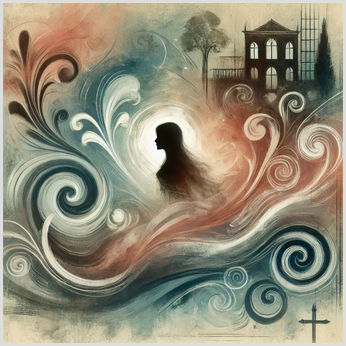Jane Eyre was written by Charlotte Brontë in 1847 under her pen name "Currer Bell". It follows the life of Jane Eyre as she becomes an adult and falls in love with her employer Mr Rochester, the master of Thornfield Hall. The novel revolutionised prose fiction, exploring Jane's moral and spiritual development through a first-person perspective. Other themes are love, independence and a critique of society, including social class.
You need to learn about the themes in Jane Eyre as part of your GCSE English Literature revision. Through Jane’s journey, Brontë uses her protagonist to challenge the norms of Victorian society, exploring the difficulty of balancing love with autonomy, as well as rigid class structures.
This article will explore these themes, giving examples from the plot and quotes. If you need further support, TeachTutti has English Literature GCSE tutors who can help you revise and learn.
Love vs. autonomy
Independence and love is a struggle that perpetuates throughout the book. Jane prizes her autonomy and moral integrity. This is put under strain in the relationship between Jane and Rochester. She falls in love with Mr Rochester but refuses to become his mistress when she discovers his secret marriage:
"I am not an angel, […] but I will not be your mistress"
Jane leaves Thornfield Hall despite her romantic love with Rochester as she knows remaining would compromise her independence and principles. Jane finally returns to Rochester when she is on a more equal footing, having received an unexpected inheritance. This final union displays mutual respect and equality, reflecting Jane's achievement of both love and autonomy.
This theme is also seen in her relationship with St. John Rivers. He proposes to Jane but she declines his offer as it is loveless and based on duty. She admires St. John but knows marrying him would mean losing herself:
"If I were what I once was, I would try to alter his course; but I am not fit to undertake it"
Social class
The relationships and decisions of Jane are affected significantly by social class. She grows up as a poor orphan dependent on her cruel aunt, with her social standing made clear. Her complicated social position as a governess places her above the servants but below the family she serves.
Jane's hesitation in her relationship with Mr Rochester is in part due to her lower social status. He dismisses these concerns, telling Jane:
"My bride is here… because my equal is here, and my likeness."
Jane continues to struggle with the disparity in her social standing when she learns about Rochester’s hidden wife. Jane chooses social and moral independence over love at this point, leaving Thornfield rather than compromising herself.
Her social position is significantly improved by an unexpected inheritance. This allows Jane to return to Rochester equal in wealth, representing a shift in the power dynamics of their relationship.
Gender roles
Jane Eyre was groundbreaking when it was released in addressing gender equality. Jane strives for equality, especially when interacting with male characters. She makes her famous declaration of independence and self-worth moments before Mr Rochester proposes:
"I am no bird; and no net ensnares me: I am a free human being with an independent will"
Jane loves Rochester, yet refuses to be subservient or dependent. She refuses to live as his mistress and to dress in finery because it will diminish her self-worth. Her decision to leave Rochester after discovering his secret marriage is as much for dignity and autonomy as it is to uphold her moral concerns.
Jane rejects St. John River's marriage proposal. He sees her as a partner for his missionary work, not an equal or a romantic companion. He wants Jane to suppress her emotions and individuality so he can realise his ambitions. Jane refuses, rejecting a life of repression in favour of personal fulfilment.
Jane marries a blinded Rochester at the end of the novel. It represents a triumph of equality as they are unions emotionally and practically. Jane is financially independent and Rochester is dependent on her care, which balances their relationship.
Religion
Religion is a complex, multifaceted influence that Jane must navigate to forge her own beliefs.
Characters like Mr Brocklehurst, Helen Burns and St. John Rivers all depict different forms of religion. Mr. Brocklehurst uses religion and spirituality to justify cruelty and control, while Helen Burns shows Christian patience and forgiveness. Jane admires Helen but she struggles to fully adopt the passivity of her faith.
St. John Rivers is austere and duty-bound in his worship. He proposes to Jane as a missionary partner without love or passion. Jane rejects this:
"I scorn your idea of love."
Jane’s spirituality emerges as a balance between Helen’s piety and St. John’s zealotry. She ultimately finds a middle ground that equally makes her happy and upholds her moral principles.
Moral Integrity
Jane makes many decisions throughout the novel with her moral integrity in mind. She is always shown to value truth and righteousness, even above her personal happiness. She leaves Thornfield when she discovers Rochester's marriage to his wife Bertha Mason. She tells him that despite her love:
"I care for myself. The more solitary, the more friendless, the more unsustained I am, the more I will respect myself."
Jane refuses to compromise on her values, preferring to face being alone and penniless rather than live in sin. This decision highlights her remarkable inner strength and strict adherence to her principles. Similarly, while Jane admires St. John's dedication to his faith, she rejects his proposal because a loveless marriage would violate her sense of self.
Ultimately, Jane chooses her path and rejects external pressures. She only returns to Rochester when she is financially equal and does not compromise her values, entering a relationship of love, equality and respect.
Final thoughts on Jane Eyre
Charlotte Brontë's Jane Eyre has complex themes that continue to resonate and be relevant in the modern world. From Jane’s struggle to balance love and autonomy, to her defiance against social class and gender inequality, the novel critiques 19th-century Victorian society. In exploring these themes, keep in mind how Brontë uses them to critique societal norms and empower her protagonist.
For future reading, follow the link to read Britanica's biography of Charlotte Brontë. You can also read SparkNote's article exploring the historical context of Jane Eyre.
If you need personalised help revising this novel, check out TeachTutti's specialist GCSE English Literature tutors. Every tutor has an enhanced DBS check and many offer first lesson discounts for new students. You can learn online or in person.
This post was updated on 10 Jul, 2025.

